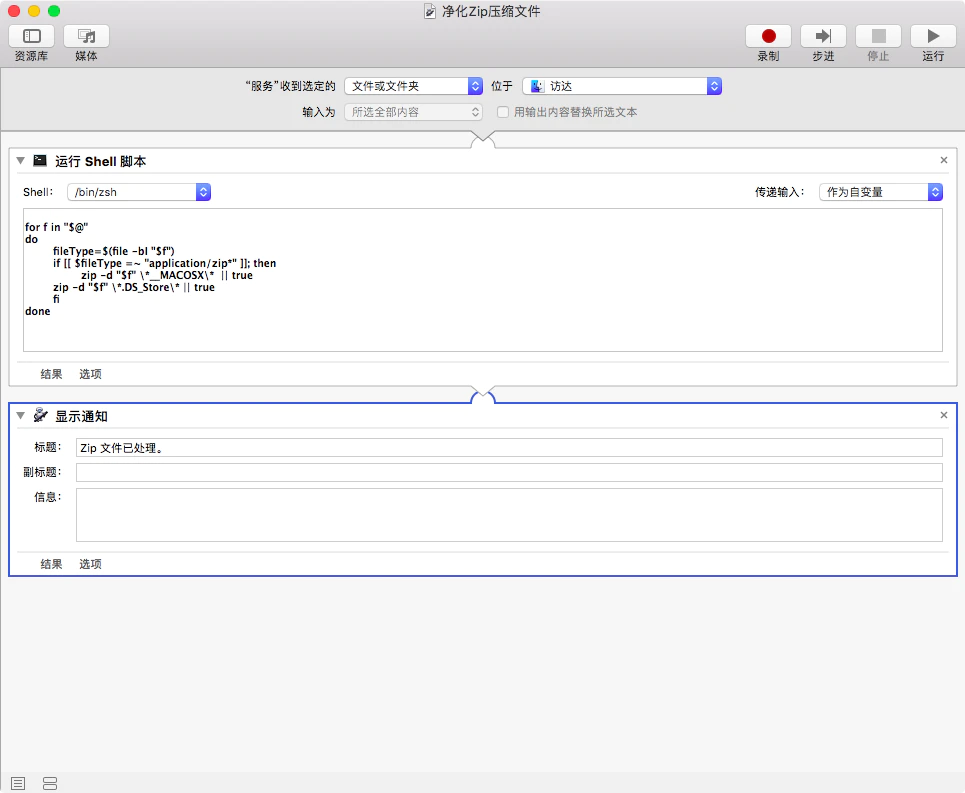Mac上的automator太好用了
mac的automator挺好用的,我发现它适合制作各种方便的右键功能!配合AI食用简直完美!这里我随便摘几个我常用的!
PS: automator的路径在:~/Library/Services,不想要的操作直接在这删了就行
右键清除zip下的隐藏文件
这个已经在mac工具箱那篇写过了;
右键进行csv编码转化
这个是最近工作遇到的问题,每次下载的csv默认都是utf-8,mac-微软excel一打开就乱码,我总是vscode打开然后修改编码,我寻思整个转化键,快速转成utf-8-sig(其实vscode也有插件支持查阅csv,但是还是觉得微软excel比较熟悉,顺手;
工作流程选“文件或文件夹”\位于“finder”
拉入运行一个shell脚本,传递输入选择“作为自变量”,内容如下,这里我使用 uchardet 来做编码检测;她是一个编码检测器库,它会返回的编码名称,与 iconv 兼容。
1
2
3
4
5
6
7
8
9
10
11
12
13
14
15
16
17
18
19
20
21
22
23
24
25
26
27
28
29
30
31
32
33
34
35
36
37
38
39
40
41
42
43
44
45
46
47
48
49
50
51
52
53
54
55
56
57
58
59
60
61
62
63
64
65
66
67
68
69
70
71
72
73
# 设置 uchardet 路径
uchardet_cmd="/usr/local/bin/uchardet"
# 检查文件编码并转换为 utf-8-sig
convert_encoding() {
local file="$1"
local result=""
# 使用 uchardet 检测文件编码
encoding=$("$uchardet_cmd" "$file")
# 检查文件是否已经是 utf-8-sig
if [[ "$encoding" == "UTF-8" ]]; then
if head -c 3 "$file" | grep -q $'\xEF\xBB\xBF'; then
result="${file##*/}: 编码无须转换\n"
else
output_file="${file%.csv}-utf-8-sig.csv"
iconv -f utf-8 -t utf-8 "$file" | sed '1s/^\xEF\xBB\xBF//' > "${file%.csv}-converted.csv"
if [[ -f "${file%.csv}-converted.csv" ]]; then
(echo -ne '\xEF\xBB\xBF'; cat "${file%.csv}-converted.csv") > "$output_file"
if [[ -f "$output_file" ]]; then
result+="${file##*/}: 成功转换\n"
rm "${file%.csv}-converted.csv"
else
result+="${file##*/}: 创建输出文件失败: ${output_file##*/}\n"
fi
else
result+="${file##*/}: 创建临时文件失败: ${file%.csv}-converted.csv\n"
fi
fi
elif [[ "$encoding" == "GB2312" ]] || [[ "$encoding" == "ISO-8859-1" ]] || [[ "$encoding" == "ASCII" ]]; then
output_file="${file%.csv}-utf-8-sig.csv"
iconv -f "$encoding" -t utf-8 "$file" | sed '1s/^\xEF\xBB\xBF//' > "${file%.csv}-converted.csv"
if [[ -f "${file%.csv}-converted.csv" ]]; then
(echo -ne '\xEF\xBB\xBF'; cat "${file%.csv}-converted.csv") > "$output_file"
if [[ -f "$output_file" ]]; then
result+="${file##*/}: 成功转换\n"
rm "${file%.csv}-converted.csv"
else
result+="${file##*/}: 创建输出文件失败: $output_file\n"
fi
else
result+="${file##*/}: 创建临时文件失败: ${file%.csv}-converted.csv\n"
fi
else
result+="${file##*/}: 不支持的文件格式 ($encoding)\n"
fi
echo -e "$result"
}
# 初始化结果变量
all_results=""
# 遍历所有选中的文件并进行转换
for file in "$@"; do
if [[ "${file##*.}" == "csv" ]]; then
file_result=$(convert_encoding "$file")
all_results+="$file_result"
else
all_results+="${file##*/}: 不是 CSV 文件"
fi
done
# 使用 osascript 显示通知
osascript -e 'display notification "'"${all_results}"'" with title "CSV转换结果"'
# 输出所有结果到标准输出
# echo -e "$all_results"
在同目录快速打开Finder
这里用到的是AppleScript,说实话我不太懂这个语言,但是没关系,AI懂就行了,我只是一个prompt工程师!
1 | on run {input, parameters} |
本博客所有文章除特别声明外,均采用 CC BY-NC-SA 4.0 许可协议。转载请注明来自 CapybaraJ!
评论





